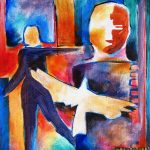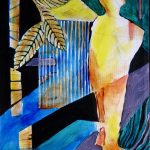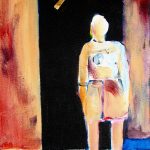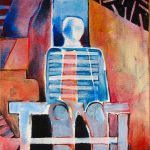The beginning of Virginia happened . . . when? That moment is lost in time. Early on, she was at the edge of my consciousness but still a writer whom, even as an English major, I had never read. Woolf wasn’t on the syllabus in any of my classes—not required reading in those days just before there were courses in feminist literature. After my graduation, I read Woolf with a vengeance. I liked the experimental novels well enough—Jacob’s Room, To the Lighthouse, The Waves—but what intrigued me most was the gradual publication of her letters and diaries.
That wealth of material gave me a window on a life radically different from my own. For a period of years, I felt as if her friends were also my friends, and that the conversations she participated in were as important to me as they were for her. It was easy to achieve this intimacy. The diaries and letters are filled with minutiae, nuanced insights, deeply personal impressions, and remembered conversations. They offer more information than most people ever reveal about their lives. The details are so extensive. It would probably be possible to chronicle Woolf’s daily life for decades.
I learned about her sister, the painter Vanessa Bell, and about Virginia’s marriage to Leonard Woolf, a Jewish writer, editor, liberal politician, and the man with whom she founded the revolutionary Hogarth Press. I was fascinated as her relationship with Vita Sackville-West unfolded, a love affair between two married women, flirtatious and communicative—resulting in the high humor and euphoria of Woolf’s novel Orlando—only to find a quieter resolution as they drifted apart.
What attracted me to Woolf? My life was completely unlike hers. I was not born into the London literati. I had my origins in a small town in northern Wisconsin. I had no famous father and no brothers at Cambridge. We definitely did not spend idyllic summers in Cornwall in a large house on the English seacoast waited on by servants, walking the beach, and playing games of cricket in the garden. My family took car trips across the American West, slogging along the interstates to see our country, camping out to save money, and eating macaroni and cheese out of a box.
I came from people whom Woolf might have dismissed or even despised and ridiculed—from farmers, mill workers, and civil servants, from those who were uneducated, at least by Woolf’s criteria. My people did not read books as a means of understanding the self, defining feelings, or interpreting the world. They worked. They were mostly just trying to survive and get by. I came from them, and yet I still wanted to be like Woolf. I wanted to write. Virginia became, at least for a decade, my higher power.
—
It’s 2006. My friend Nancy and I are touring London. I am here partly in pursuit of my mentor—Virginia Woolf. At this point, I’ve read everything she’s written. I’ve waltzed through that embarrassment of riches—the printed pages she left behind—her novels, letters, diaries, essays, and articles. Now I’m walking the streets she walked.
It’s dusk when we board the London Eye for a bird’s-eye view of the city beginning to turn on its lights. In our glass car, we rise and fall while feasting on this unparalleled view of London. Although it undoubtedly looked different in her time, this is Woolf’s city—a place she inhabited in all ways. After the ride, we choose to dine at the café in the crypt below St. Martin’s in the Fields. I order mushroom stroganoff with delicate new potatoes and a fennel salad. Nancy has a dish with steamed broccoli, cauliflower, and Savoy cabbage. Our globed glasses of white wine fracture light into the vaulted space.
It’s wonderful, yes, and isn’t this a moment Woolf might have chosen to memorialize? It seems to me I should write about it. What are we saying to one another? What are my thoughts and impressions of this day? If I don’t get this down somehow, won’t it be lost forever? I wonder. Does that really matter? Isn’t it enough that Nancy and I are here sharing this moment?
Later, I lie awake with jet lag thinking about Woolf’s second novel, Jacob’s Room. After a galloping romp through a young man’s life at Cambridge, we learn that Jacob, the protagonist, has died as a soldier in World War I. The final scene of the novel has Jacob’s mother and one of his friends cleaning out his rooms. They find Jacob’s papers strewn across his desk as though he had left for a stroll in the park.
There’s a horror in this vision, a sense of futility and emptiness. A person—vital and rich with life—is suddenly gone. The novel poses the ultimate question. What is left of all that sensation, what remains of so much rich lived experience once the person has passed? It occurs to me that, in her novels, Woolf is almost always writing toward the same end game. Yes, this is happening—this vivid and incredibly complex life tapestry. Yet, it’s also disappearing. Suddenly, because of either time or death, a chunk of it is gone, lost forever.
Woolf’s most autobiographical novel, To the Lighthouse, chronicles a family’s summer in Cornwall. But those moments are also lost. When they return to the house on the shore years later, the whole emotional tenor and tempo of their lives has changed. The mother has died, leaving them to struggle. The long-awaited trip to the lighthouse takes on a completely different meaning than it did on a day in the distant past when it was impossible to go because of bad weather.
At the novel’s end, Lily Briscoe, a peripheral character, takes center stage. She is a spinster and a Sunday painter, a woman not taken seriously by the male-dominated art world. Yet, she perseveres. Lily is at work painting the Cornwall scene when the family returns. Finally, almost giving up in frustration, unable to express the whole as she sees it, Lily declares a truce. The painting must be finished. There’s nothing more to be done. “I have had my vision,” she announces. And this seems the best we can hope for—to have that vision and attempt to record something about it even as the moment is passing.
Woolf tries to preserve those moments that don’t last, the globes of being and experience that simply disappear. She seems to be saying it’s important to celebrate the freshness, newness, and immediacy that make the world overflow. But the other side of this promise is the tragedy of time passing, the heartbreak of death and loss. I can clearly see this is Woolf’s vision. But is it mine?
After my trip to London, sick of the insistent need to turn every experience into copy, I stopped writing for five or six years. I told myself it was enough to have my experiences without constantly formulating words to describe them. It was an immense relief. My mind felt free. And yet, there must have been something of a warring voice within me because I saved my notes—notes about that day in the city and the meal I shared with Nancy. I must have believed that, one day, I would need or want them, and I did. But when I finally began to write again, it was with a different attitude. I knew I could live without writing, even without Virginia.
—
The Buddhists say that, to become enlightened, you must actually kill the Buddha, meaning you must destroy your idols. This comes from an old Zen koan attributed to the Zen Master Linji, a Chinese Zen Buddhist monk who founded the Rinzai sect of Zen Buddhism and who died in 866.
The saying says: If you meet a Buddha, kill the Buddha.
I guess I did this to Woolf after my trip to London. Not that I actually killed Virginia, but I doubted her. I saw her as a person, brilliant but limited, part of her own time, her class, and her culture. Woolf gave me a window on her world but not a passage into it. She had been my teacher, but perhaps I had learned what I needed to learn from her. She taught me to pay attention, to notice details, to hear my environment, and to listen to my own thoughts. At this realization, there was disappointment and a sense of loss. It felt a bit like losing an old friend either to death or indifference. It’s all well and good to have idols, but suddenly, I knew I would never be this person who spent three weeks touring Greece with the painter and art critic Roger Fry.
Woolf’s festival of words took me somewhere. She got me to London and enriched my time there. But in the end, I returned home, leaving England for my own geographical and personal world. My physical and spiritual home for most of my life has been the northern boreal forest of North America. It’s a place where I walk on footpaths between towering trees, a place where I count my breaths while listening for the air rush of bird wings. This is where I belong.
This winter has been a hard one. Nearby, just off the footpath, several crows feed on the remains of unidentifiable dead animal. Busily tearing toward the center of the carcass for red meat, the two companionable black birds ignore this approaching human. Likewise, a soaring red-tailed hawk offers me no greeting as it flies overhead and beyond my field of vision. As I tread my forest path, I experience the spaciousness that exists outside and beyond words.
Don’t get me wrong. I love words for their capacity to partially tame the world’s wildness. I adore them as they lean into metaphor and traverse distances. But I see their limitations. Words are temporary containment fields. I believe that, although words were her medium, Woolf understood this. She was always writing into the void, always using language to push toward the no-word zone. In novels that exist on the margins of human experience—Jacob’s Room, To the Lighthouse, The Waves—Virginia has taken me to regions where there is simply nothing more to say.
What can we know of poor Jacob after he has passed? Lives and loves succumb to time. Individuals exist for a while and then they are gone. The waves roll toward the shore, relentlessly washing away all footsteps on the beach. Eventually, through her suicide, Woolf crossed the ultimate barrier. No one could follow her into that beyond. Still, during her lifetime, Virginia returned to the place of making again and again. She tried to hold her ground even as that ground was slipping out from underneath her. She had a faith I sometimes lose. When I tire of carefully wrought language, I leave my writing desk and head into the woods seeking the place of no-words.
Entering this wordless zone is another way of killing the Buddha. But I know he isn’t really dead. I’ll be back at my computer soon enough. Tall pine trees creak in the wind. It seems that, though it is incomprehensible to me, they speak in a language all their own. And suddenly I get it. Virginia is the hawk flying away from me. She was here but she’s moved beyond my field of vision. I can’t say where she is now or what she is like. I’m not even sure what I am like, but I am resolved. I turn back on the path that will take me home. My house isn’t far away, really no distance at all.



